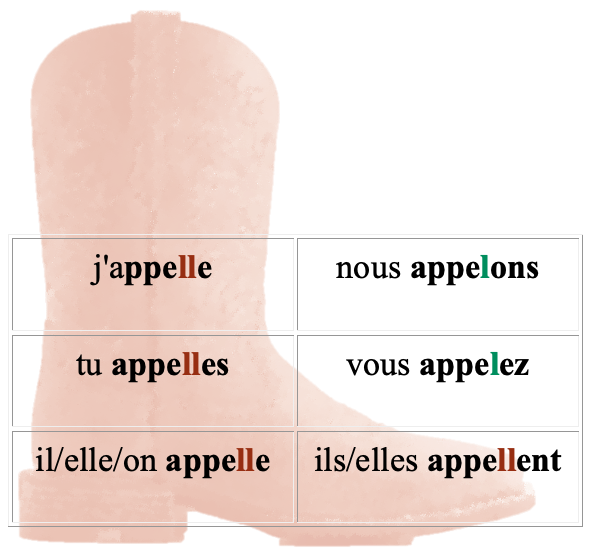3 – Les vacances
Grammaire: 3.4 – Les verbes irréguliers en -er
Irregular -er verbs
Some verbs in -er do not follow the same patterns study for regular verbs in -er (see here for a review if needed).
Spelling changes occur only in the stems of several groups of -er verbs in the present tense (the endings are regular). These spelling changes in the stem reflect the pronunciation of the present tense forms.
There are six different groups of these irregular verbs in -er:
Catégorie 1: double consonant in the boot
You may have already noticed the spelling change in the verb s’appeler (Je m’appelle …, My name is …).
For verbs like appeler (to call) and jeter (to throw), the consonant –l or -t in the the stem doubles in all forms of the present tense, except in the first and second person plural (nous and vous).
| appeler ‘to call’ | |
| j’appelle | nous appelons |
| tu appelles | vous appelez |
| elle/il/eil/on appelle | elles/ils/eils appellent |
Notice that the forms where the consonants is doubled (je, tu, il/elle, ils/elles) coincides with a “boot” shape:

These categories of irregular -er verbs are sometimes called “boot verbs” because their rules mostly apply to the forms in the boot (all except in the nous and vous forms)
Catégorie 2: accent change in the boot
This same “boot” pattern is repeated in spelling change verbs like préférer (to prefer). In these verbs the é in the last syllable of the stem changes to an è, except in the first and second person plural (nous and vous = in the boot). Listen carefully to the different pronunciations of é and è in the conjugations below.
| préférer ‘to prefer’ | |
| je préfère | nous préférons |
| tu préfères | vous préférez |
| elle/il/eil/on préfère | elles/ils/eils préfèrent |
Verbs conjugated like préférer include:
- espérer , to hope
- répéter, to repeat
Catégorie 3: accent added in the boot
In verbs which are conjugated like acheter (to buy), the e in the last syllable of the stem also changes to an è, again with the exception of the first and second person plural forms.
| acheter ‘to buy’ | |
| j’achète | nous achetons |
| tu achètes | vous achetez |
| elle/il/eil/on achète | elles/ils/eils achètent |
Verbs conjugated like acheter include:
- amener, to bring somebody (along)
- emmener, to take somebody (along)
Catégorie 4: “y” becomes “i” in the boot
Another group of stem-changing verbs include those ending in –ayer. In these verbs the y changes to i in all persons except the first and second person plural (nous and vous).
| essayer ‘to try’ | |
| j’essaie | nous essayons |
| tu essaies | vous essayez |
| elle/il/eil/on essaie | elles/ils/eils essaient |
Verbs conjugated like essayer include:
- payer, to pay
Catégorie 5: extra “e” (only in the “nous” form)
Verbs ending in -ger like voyager (to travel) add an e after the g in the nous form of the present tense, so that the g is pronounced as a soft sound before the –ons ending (i.e. nous voyageons).
| voyager ‘to travel | |
| je voyage | nous voyageons |
| tu voyages | vous voyagez |
| elle/il/eil/on voyage | elles/ils/eils voyagent |
Other verbs like voyager include:
- manger, to eat
- nager, to swim
- partager, to share
Catégorie 6: added accent “ç” (only in the “nous” form)
Similarly, verbs ending in -cer like commencer (to start) add an accent cédille (ç) before the -ons ending in the nous form of the present tense, so that the c in the nous form changes to ç to keep the soft c sound (nous commençons).
| commencer ‘to start’ | |
| je commence | nous commençons |
| tu commences | vous commencez |
| elle/il/eil/on commence | elles/ils/eils commencent |

1
2
3
4
5
6
7
8
9
10
11
12

